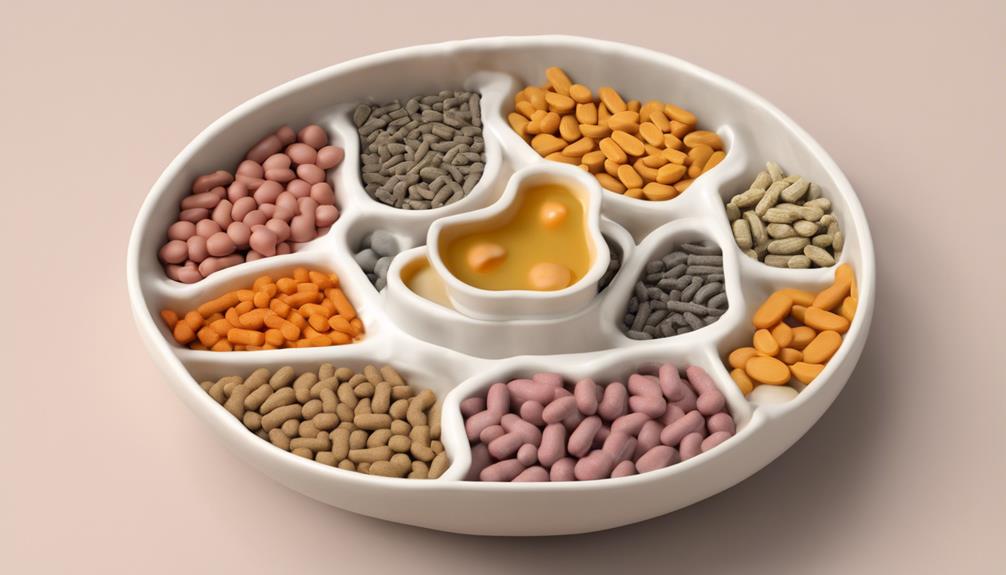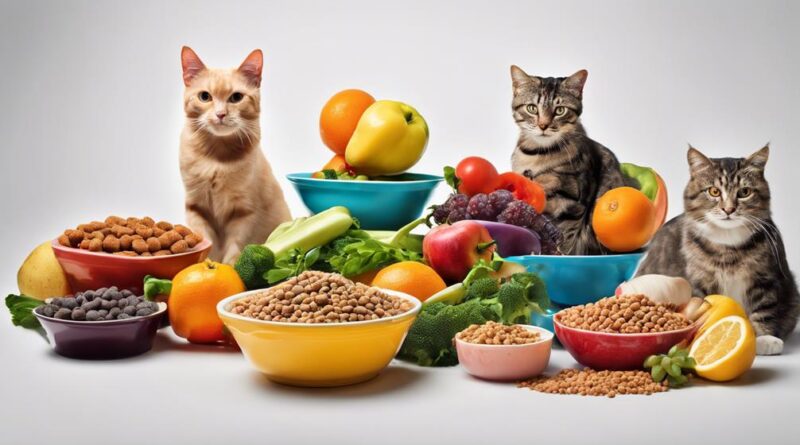12 Essential Nutritional Tips for Indoor Cats
Indoor cats have unique nutritional needs that differ from their outdoor counterparts. Did you know that their diet plays a crucial role in their overall health and well-being?
Understanding these 12 essential nutritional tips can help you provide the best care for your indoor feline companion. From protein requirements to hydration tips, each aspect contributes to their longevity and happiness.
Stay tuned to uncover these vital insights that will benefit your beloved indoor cat.
Importance of Indoor Cats' Diet
Ensuring your indoor cat receives a balanced diet is crucial for their overall health and well-being. Behavioral enrichment plays a significant role in maintaining your cat's mental and emotional health. Providing interactive toys, climbing structures, and puzzle feeders can help prevent boredom and reduce stress, leading to a happier and more content feline companion. These enrichment activities mimic natural hunting behaviors, keeping your indoor cat physically and mentally stimulated.
Weight management is another essential aspect of your indoor cat's diet. With limited space to roam and exercise, indoor cats are prone to weight gain if not fed and monitored correctly. To help control their weight, ensure you're feeding them the appropriate amount of food based on their age, weight, and activity level. Incorporating interactive feeding methods, such as food puzzles or slow feeder bowls, can also help prevent overeating and promote healthier eating habits. Additionally, regular play sessions and engaging your cat in activities that encourage movement can aid in weight management.
Protein Requirements for Indoor Cats
To maintain optimal health for your indoor cat, it's crucial to understand and meet their specific protein requirements. Protein is an essential nutrient for cats as it supports various bodily functions like muscle maintenance and immune system health. When selecting the best protein sources for your indoor cat, consider factors such as the digestibility of the protein.
Here are some key points to keep in mind regarding protein requirements for indoor cats:
- Protein Sources: Opt for high-quality protein sources such as chicken, turkey, fish, and eggs. These animal-based proteins contain all the essential amino acids that your cat needs for overall well-being.
- Digestibility Factors: Choose protein sources that are easily digestible for your cat's gastrointestinal system. This helps in maximizing the absorption of nutrients and reduces the likelihood of digestive issues.
- Plant-Based Proteins: While cats are obligate carnivores, small amounts of plant-based proteins like soy or peas can be included in their diet. However, animal-based proteins should still be the primary protein source.
- Consult Your Veterinarian: If you're unsure about the best protein sources for your indoor cat or if your cat has specific dietary requirements, consult your veterinarian for personalized recommendations.
Essential Vitamins for Indoor Cats
Indoor cats require essential vitamins to support their overall health and well-being. Vitamin deficiencies can lead to various health issues in cats, making it crucial to ensure they receive the necessary vitamins through their diet. A balanced and complete cat food is designed to provide most of the essential vitamins your indoor cat needs. However, there are instances where dietary supplements may be beneficial.
Vitamin deficiencies can arise if your cat's diet is lacking in certain nutrients. For example, a deficiency in Vitamin A can lead to vision problems, while a lack of Vitamin D may cause issues with calcium absorption and bone health. It's essential to monitor your cat's overall health and consult with a veterinarian if you suspect any deficiencies.
In some cases, dietary supplements may be recommended to address specific health concerns or deficiencies. However, it's crucial to consult with a vet before introducing any supplements to your cat's diet. Giving your cat excessive amounts of certain vitamins can also be harmful, so it's essential to follow your vet's advice closely.
Hydration Tips for Indoor Cats
Keeping your indoor cat properly hydrated is essential for maintaining their overall health and well-being. Here are some hydration tips to ensure your feline friend stays healthy and happy:
- Provide Access to a Water Fountain: Cats are naturally attracted to running water, so investing in a water fountain can encourage them to drink more. The freshness and movement of the water in a fountain can be more appealing to your cat than stagnant water in a bowl.
- Incorporate Wet Food into Their Diet: Wet food has a higher moisture content compared to dry kibble, which can help keep your cat hydrated. Consider adding wet food to their diet or using it as a treat to increase their overall water intake.
- Monitor Their Water Intake: Keep an eye on how much water your cat is drinking daily. If you notice a sudden decrease in water consumption, it could be a sign of an underlying health issue that needs to be addressed by a veterinarian.
- Clean Water Bowls Regularly: Cats are sensitive to the smell and taste of water, so make sure to clean their water bowls frequently. Using glass or stainless steel bowls can also help prevent bacterial growth and keep the water fresh for your cat.
Fiber Needs for Indoor Cats
Maintaining a proper balance of fiber in your indoor cat's diet is crucial for their digestive health and overall well-being. Fiber plays a significant role in regulating your cat's digestion and preventing issues such as constipation. Adequate fiber intake ensures that your cat's gastrointestinal system functions smoothly and helps prevent hairballs by promoting their elimination through the digestive tract.
When considering fiber sources for your indoor cat, look for high-quality cat foods that include ingredients like beet pulp, pumpkin, oats, and brown rice. These ingredients are excellent sources of fiber that can aid in maintaining a healthy digestive system. Additionally, you can offer small amounts of cooked vegetables like carrots or green beans as treats to supplement your cat's fiber intake.
Incorporating the right amount of fiber into your cat's diet can help prevent digestive problems and ensure their overall well-being. However, it's essential to strike a balance, as too much fiber can lead to issues like diarrhea. Consulting with your veterinarian can help you determine the optimal fiber intake for your cat based on their individual needs.
Managing Indoor Cats' Weight
To help your indoor cat maintain a healthy weight, focus on providing balanced nutrition and engaging them in regular physical activity. Proper portion control is essential to prevent overeating. Make sure to measure out your cat's food according to the feeding guidelines on the packaging.
Additionally, establishing an exercise routine is crucial for keeping your cat active and helping them burn off excess calories. Here are some tips to manage your indoor cat's weight effectively:
- Interactive Toys: Invest in toys that encourage your cat to move around and play, such as laser pointers or feather wands.
- Cat Trees or Scratching Posts: Provide climbing structures or scratching posts to promote physical activity and prevent boredom.
- Scheduled Playtime: Set aside dedicated time each day to engage with your cat in interactive play sessions.
- Food Puzzles: Use food puzzles or interactive feeders to make mealtime more stimulating and slow down your cat's eating pace.
Indoor Cats' Special Dietary Needs

To ensure your indoor cat's optimal health, it's important to address their special dietary needs which can vary from those of outdoor cats. Indoor cats are less active compared to outdoor cats, making it crucial to manage their diet carefully. One key aspect of indoor cats' special dietary needs is dental care. Since indoor cats may not have access to rough surfaces that naturally help wear down their teeth, incorporating dental treats or specialized dental diets can promote good oral health. These options can help reduce tartar buildup and maintain your cat's dental hygiene.
When considering treat options for your indoor cat, it's essential to choose wisely. Treats should make up only a small portion of your cat's daily caloric intake to prevent weight gain. Opt for treats that are low in calories and specifically designed for indoor cats. Additionally, look for treats that serve a dual purpose, such as promoting dental health while also satisfying your cat's cravings. Treats that are crunchy or require chewing can also provide some dental benefits by helping to clean your cat's teeth as they eat.
Supplements for Indoor Cats
Considering the health and well-being of your indoor cat, incorporating supplements into their diet can provide additional support in meeting their specific nutritional requirements. When choosing supplements for your indoor cat, it's important to focus on key areas such as digestive health and skin health to ensure they thrive in their indoor environment.
- Digestive Health: Opt for supplements containing probiotics to promote a healthy gut flora and aid in digestion. Probiotics can help prevent issues like diarrhea or constipation that indoor cats may be prone to due to their sedentary lifestyle.
- Skin Health: Look for supplements rich in omega-3 fatty acids, which can help maintain a healthy coat and skin. Indoor cats may not receive enough sunlight for proper vitamin D synthesis, making omega-3 supplements essential for skin health.
Supplements tailored to support digestive and skin health can be beneficial additions to your indoor cat's diet. Remember to consult with your veterinarian before introducing any new supplements to ensure they're appropriate for your cat's individual needs. By providing these extra nutrients, you can help your indoor cat lead a healthier and happier life.
Frequently Asked Questions
Can Indoor Cats Still Benefit From Outdoor Exercise for Their Overall Health?
You bet! Even indoor cats can benefit from outdoor adventures. Getting some fresh air and exercise can do wonders for your indoor feline.
There are plenty of exercise options for indoor cats, and outdoor adventures can provide new stimulation and excitement. Just make sure to supervise your cat during these outings to ensure their safety, and always make a smooth transition back inside after the fun is over.
How Can Indoor Cats Get Enough Mental Stimulation Through Their Diet?
To ensure your indoor cat gets enough mental stimulation through their diet, consider incorporating enrichment toys and treats.
Additionally, setting up outdoor enclosures or providing window perches can offer them a glimpse of the outside world.
These options can help keep your feline friend entertained and mentally engaged, promoting their overall well-being even when they spend most of their time indoors.
Are There Any Specific Feeding Schedules or Meal Timings That Are Recommended for Indoor Cats?
To ensure your indoor cat's health, consider feeding them at consistent times daily for proper feeding frequency. This routine can aid in weight management.
Portion control is crucial; adjust based on your cat's needs. Snack options can be given sparingly but keep an eye on overall calorie intake.
What Are Some Common Mistakes to Avoid When Feeding Indoor Cats?
When feeding indoor cats, avoid common mistakes like improper portioning and lack of dietary variety. Make sure you're giving them the right amount of food and mixing up their meals to keep them healthy and satisfied.
Vary their diet to ensure they get all the nutrients they need. By paying attention to portion sizes and offering a diverse range of foods, you can help your indoor cat stay happy and healthy.
How Can Indoor Cat Owners Monitor Their Cat's Nutritional Intake and Ensure They Are Meeting All Their Dietary Needs?
To monitor your cat's nutritional intake and meet all their dietary needs, consider using interactive feeding toys to encourage exercise and mental stimulation.
Additionally, try making homemade cat treats for a healthier snack option.
Conclusion
So there you have it, 12 essential nutritional tips to keep your indoor cat happy and healthy. By providing a balanced diet, plenty of hydration, and monitoring their weight, you can ensure your feline friend lives a long and thriving life.
Don't forget to consult your veterinarian for any specific dietary needs or concerns. With the right care and attention, your indoor cat will be purring with contentment for years to come.
